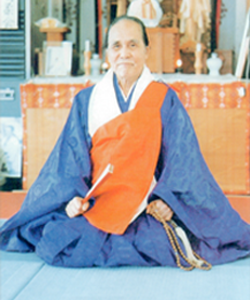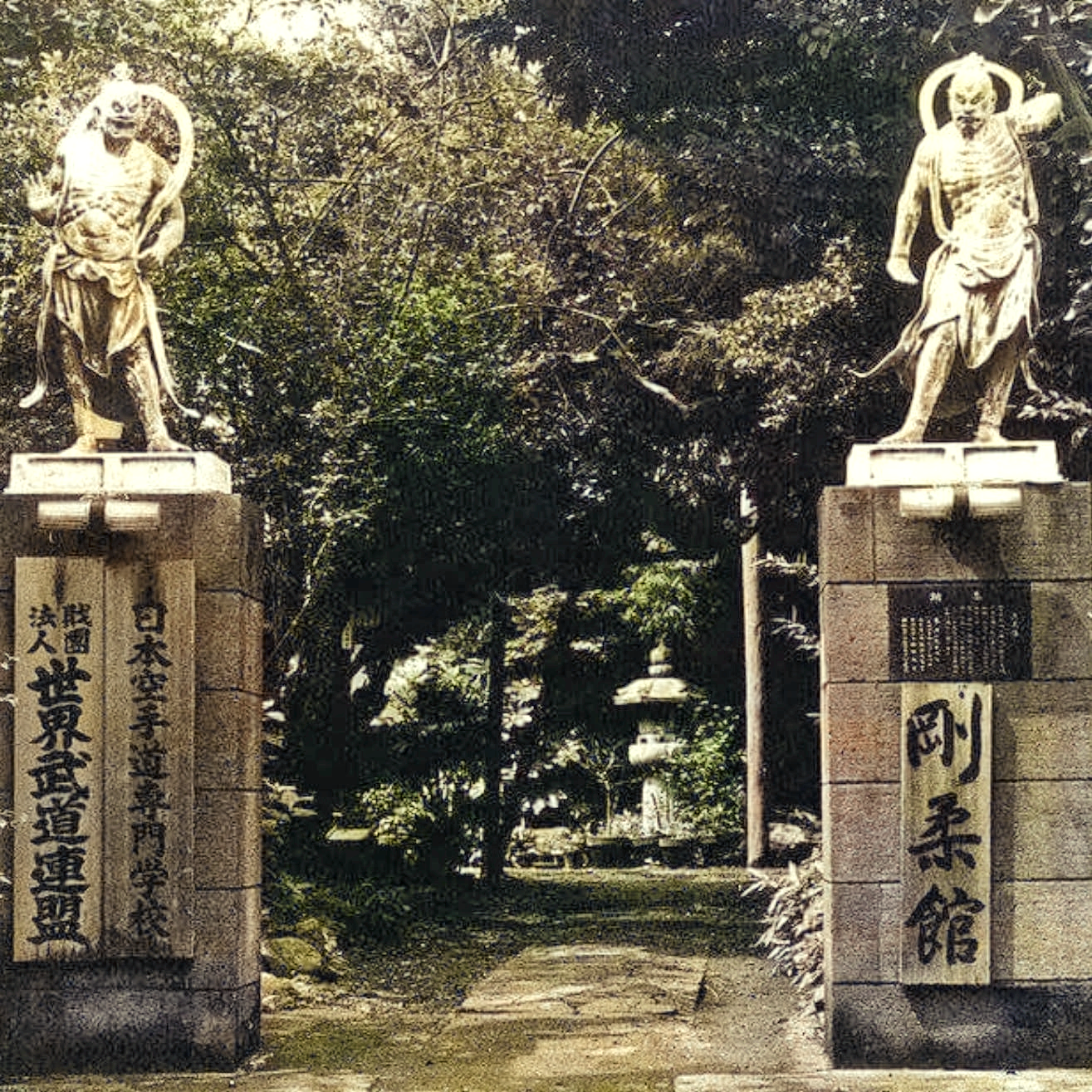
Goju-kenpo 剛柔拳法 Goju Fist Method or, if you prefer, Ceberano-ha Goju-ryu
Karatejutsu, is Ceberano Hanshi’s karate method.
This method builds on the legacy of YAMAGUCHI Gogen Hanshi as he expressed it at his Zen’nihon Karate-do Senmon Gaku 全日本空手道専門学校, the All Japan Karate-do Special School, known
colloquially as the All Japan Karate College, located below Yamaguchi's home in the Tokyo suburb of Suginami.
Yamaguchi Hanshi taught much more than Goju-ryu karate
at his karate college, he had instructors from other forms of karate, Shotokan, Shito-ryu, and Wado-ryu and well as Okinawan Kobujutsu from INOUE
Motokatsu Hanshi, headmaster of Yushin-kai karatejutsu and the Ryukyu
Kobujutsu Hozon Shinkokai 琉球 古武術 保存 新古会 or Ryukyu Ancient Martial Arts Preservation Society.
Teaching the Okinawan weapons arts of Master TAIRA Shinken. Yamaguch
Hanshi also taugh Shinshin-toitsu-do or Japanese Yoga at the college.

Yamaguchi Gogen Hanshi

The Sekai Kushino Kobujutsu Kenkyukai Goju-kenpo is organised under a sub-department called the Kokusai Goju-kenpo Kenkyukai 国際剛柔拳法研究会 International Goju Fist Method Research Society or IGK 剛柔拳法 Goju Fist Method or, if you prefer, Ceberano-ha Goju-ryu
Karatejutsu, is Ceberano Hanshi’s karate method.
This method builds on the legacy of YAMAGUCHI Gogen Hanshi as he expressed it at his Zen’nihon Karate-do Senmon Gaku 全日本空手道専門学校, the All Japan Karate-do Special School, known
colloquially as the All Japan Karate College, located below Yamaguchi's home in the Tokyo suburb of Suginami.
Entrance to the Senmon Gakku

Yamaguchi Gogen Hanshi
with Ceberano Hanshi in Tokyo
Ceberano Hanshi being
tested by Yamaguchi Hanshi
Left to Right: Sal Ebenez Sensei, Yamaguchi Hanshi,
Ceberano Hanshi and Garry Spears Sensei
The Goju-kenpo Kenkyukai syllabus is build around the skills and methods found in the kata of Yamaguchi-ha Goju-ryu karatejutsu with the addition of kata and kihon found in the following Uchinadi 沖縄 ⼿ or Okinawa-te traditions:
Nafadi 那覇手 (Japanese Naha-te) or Naha Hand – Karate from the Naha District including Goju-ryu.
Tumaidi 泊手 (Japanese Tomari-te) or Tomari Hand – Karate from the Tomari District, the Gohakukai, Motobu-ryu and Shorinji-ryu traditions.
Suidi 首里手 (Japanese Shuri-te) or Shuri Hand – Karate from the Shuri District - The various Shorin-ryu traditions.
Okinawa Baihe Quan 沖縄白鶴拳 Okinawa Hakkaku-ken or Okinawan White Crane Fist - Kingai-ryu 金硬流 and the various Southern Chinese traditions found in
Okinawa.
In addition to the karatejutsu techniques you would expect to find senior students of Goju-kenpo are also required to acquire competency in:
First Aid - must have current "Apply First Aid" certification or equivalent.
Kuatsu - Three levels of certification in Traditional Japanese Rescusitation and Treatment Methods and Attacking Vital Points as directed by the headmaster.
Goju-kobjutsu - Multiple levels of certification in tradtional Japanese Kobujutsu as directed by the headmaster.
Goju-kalis - Multiple levels of certification in tradtional Filipino Martial Arts as directed by the headmaster.
Intructor Accreditation - Senior student that wish to become instructors are required to complete the MA-IAP Martial Arts Instructor Accreditation Programme.
As students’ progress through their Goju-kenpo training they will be qualify for progress awards.
Mudansha 無段者 students, that is, students that have not yet achieved a dan grade, both Junior and adult, train towards what are known as Kyu級 Grades, commonly called "coloured belt" grades, the actual meanings of kyu are "class" "rank" or "grade."
Mudansha grades progress as follows:
| Mukyu | 無級 | 10th Kyu Novice or White Belts |
| Kukyu | 九級 / 玖級 | 9th Kyu Yellow Belt |
| Hachikyu | 八級 / 捌級 | 8th Kyu Yellow Belt with one (1) Green bar |
| Nanakyu | 七級 / 漆級 | 7th Kyu Yellow Belt with two (2) Green bars |
| Rokukyu | 六級 / 陸級 | 6th Kyu Green Belt |
| Gokyu | 五級 / 伍級 | 5th Kyu Green Belt with one (1) Brown bar |
| Yonkyu | 四級 / 肆級 | 4th Kyu Green Belt with two (2) Brown bars |
| Sankyu | 三級 / 参級 | 3rd Kyu Brown Belt |
| Nikyu | 二級 / 弐級 | 2nd Kyu Brown Belt with one (1) Black bar |
| Ikkyu | 一級 / 弐級 | 1st Kyu Brown Belt with two (2) Black bars |
| Shodan-ho | 初段補 | Probationery Black Belt 1st Level |
Yudansha 有段者 students, that is, students that have achieved a entry level dan grade, both Junior and adult, train towards what are known as Dan 段 Grades, commonly called "black belt" grades, the actual meanings of dan are "grade," "steps" or "stairs."
Yudansha grades progress as follows:
| Shodan | 初段 | Black Belt 1st Level |
| Nidan | 二段 / 弐段 | Black Belt 2nd Level |
| Sandan | 三段 / 参段 | Black Belt 3trd Level |
| Yondan | 四段 / 肆段 | Black Belt 4th Level |
Note: Junior students will normally be limited to Shodan and Nidan unless otherwise authorised by the headmaster
Kodansha 高段者 students, that is, students that have achieved a senior level dan grade, also train towards what are known as Dan 段 Grades, but at a more senior level. Kodansha grades progress as follows:
| Godan | 五段 / 伍段 | Black Belt 5th Level |
| Rokudan | 六段 / 陸段 | Black Belt 6th Level |
| Nanadan | 七段 / 漆段 | Black Belt 7th Level |
| Hachidan | 八段 / 捌段 | Black Belt 8th Level |
| Kudan | 九段 / 玖段 | Black Belt 9th Level |
| Jun Judan | 準十段 / 準拾段 | Provisional Black Belt 10th Level - Seniors designated to assist the headmasters successor |
| Judan | 十段 / 肆段 | Black Belt 10th Level |
Shogo 称号 Teaching Titles
Yudansha and Kodansha students may be awarded titles to recognise their contribution to the society. These individuals may, ig they choose to, wear a different coloured belt that indicates their status as a title holder. The society may award the following titles:
| Senpai | 先輩 | A Senior Student | Typically back belt students under Sandan - Senpai wear a plain black belt |
| Sensei | 先生 | A Teacher | Typically students Sandan or above - Sensei wear a plain black belt |
| Kyouren | 教練 | An Experienced Student | Typically Sandan or above but not a qualified instructor Must wear a plain black belt |
| Shidouin | 指導員 | An Assistant Instructor | Sandan or above assigned to a dojo to assist a more experienced intructor May wear a black belt with a thin red stripe along the centre of the belt |
| Jokyou | 助教 | An Assigned Senior Student | Typically
Yondan or above assigned to
assist at an established dojo May wear a black belt with a thin red stripe along the centre of the belt |
| Renshi | 練士 | An Experienced Teacher | Typically Yondan or above May wear a longitudinally split belt with one half red and the other half white Worn with the red half on top |
| Shihan | 師範 | A Senior teacher | Typically Godan or above May choose to wear a longitudinally split belt with one half red and the other half black - Worn with the red half on top |
| Kyoushi | 教士 | An Expert teacher | Typically Rokudan
or above RokudanKyoushi may wear a red and white section belt NanadanKyoushi may wear a red and black section belt |
| Hanshi | 範士 | A Master teacher | Hachidan
or above HachidanHanshi may wear an All-Red Belt with White ends KudanHanshi may wear an All-Red Belt with Black ends Jun JudanHanshi may wear an All-Red Belt with Black ends and a single Gold stripe across the black section at each end JudanHanshi may wear an All-Red Belt |
created with
Website Builder Software .